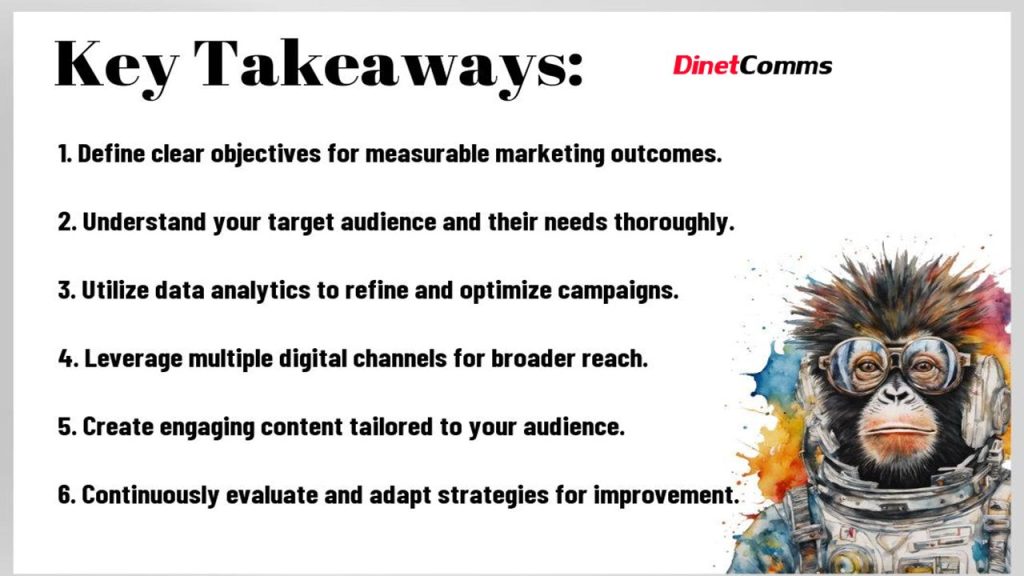Planning for Success: How to Create the Best Digital Marketing Strategy
There’s no denying that a well-crafted digital marketing strategy is vital for your business’s success. By understanding the key components of effective planning, you can significantly improve your online presence and drive results. This article will guide you through identifying your goals, understanding your audience, and choosing the right channels to boost your marketing efforts. With precise execution and ongoing evaluation, you can transform your planning for success: how to build the best digital marketing strategy, turning potential pitfalls into opportunities for growth and ensuring your brand flourishes in the digital landscape.
Key Takeaways:
- Define Your Goals: Establish clear and measurable objectives to guide your digital marketing strategy.
- Know Your Audience: Conduct thorough research to understand your target demographic and their preferences.
- Choose the Right Channels: Select digital platforms that align with your audience’s habits and business goals.
- Create Quality Content: Focus on producing valuable and relevant content that engages your audience and encourages sharing.
- Utilize Analytics: Leverage data analytics to track performance metrics and adapt your digital marketing strategy accordingly.
- Budget Wisely: Allocate your resources effectively to ensure that every aspect of your plan is adequately funded.
- Stay Flexible: Be prepared to adjust your strategies in response to market changes and new trends.
Understanding Digital Marketing
To succeed in today’s competitive landscape, it is crucial to grasp the fundamentals of digital marketing. This knowledge lays the groundwork for creating an effective digital marketing strategy that aligns with your business goals.
Definition of Digital Marketing
Digital marketing refers to the use of digital channels and technologies to promote products, services, or brands. This comprehensive approach encompasses various online platforms, including search engines, social media, email, and websites, allowing you to connect with potential customers where they are mostly active.
Importance of Digital Marketing in Today’s Landscape
Definition: In an increasingly digital world, digital marketing offers unparalleled opportunities for you to reach a broad audience and engage with them effectively, making it a vital component of your overall marketing strategy.
Importance: The significance of digital marketing today lies in its ability to provide actionable insights and measurable results. With consumers spending a significant amount of time online, leveraging digital marketing allows you to effectively target specific demographics, enhance your brand’s visibility, and ultimately drive customer engagement and conversions. The landscape is constantly evolving, and adapting your strategies to this changing environment is vital for sustained growth.
Key Components of Digital Marketing
Today digital marketing encompasses various key components, including SEM (Search Engine Optimization – SEO & PPC), content marketing, social media marketing, and email marketing. Understanding these elements will empower you to develop a comprehensive strategy tailored to your business’s unique needs.
Digital marketing revolves around these core components, each playing a significant role in reaching your target audience. By integrating these strategies into your overall marketing plan, you can maximize your online presence, create meaningful connections with consumers, and achieve measurable results. Focus on aligning these components with your objectives to create a powerful marketing strategy that drives success.

Setting Clear Objectives
You need to set clear objectives to ensure your digital marketing strategy is effective and focused. Clear objectives not only guide your campaign but also provide measurable outcomes to evaluate success. Without defined goals, your efforts may lack direction, making it difficult to track progress or adjust strategies as needed.
Identifying Your Target Audience
Audience segmentation is crucial for creating tailored marketing messages. Start by researching the demographics, preferences, and behaviors of your potential customers. Understanding your target audience allows you to craft strategies that resonate with them, ultimately enhancing engagement and conversion rates.
Defining SMART Goals
Any successful marketing plan hinges on well-defined objectives. The SMART criteria—Specific, Measurable, Achievable, Relevant, and Time-bound—help you create goals that are clear and actionable. This means avoiding ambiguous statements and focusing on what you truly want to achieve within a designated timeframe.
Your SMART goals should reflect your overall vision while remaining practical and effective. For example, instead of saying “increase sales,” specify “increase online sales by 20% in the next quarter.” This clarity helps you monitor progress, make informed decisions, and pivot strategies if needed.
Aligning Marketing Objectives with Business Goals
Defining your marketing objectives with broader business goals ensures that all efforts contribute to the company’s overall success. Aligning these objectives creates synergy and enhances the effectiveness of your campaigns.
Plus, when you ensure your marketing objectives support key business targets like revenue growth and market expansion, you elevate your marketing’s impact. This alignment fosters collaboration across departments, maximizing resources and boosting your chances of achieving both marketing and business success.

Crafting Your Strategy
After you’ve assessed your goals and resources, it’s time to focus on crafting a robust digital marketing strategy that aligns with your objectives.
Choosing the Right Digital Marketing Channels
Choosing the right digital marketing channels is crucial for reaching your target audience effectively. You need to evaluate where your potential customers spend their time online, whether that’s on social media, search engines, or email. Each channel offers unique advantages and drawbacks, so select the ones that align best with your goals and audience demographics.
Developing a Unique Value Proposition
The essence of your brand lies in your unique value proposition (UVP). It clearly defines what sets your product or service apart from the competition and why customers should choose you. A compelling UVP articulates the unique benefits you offer and addresses the specific needs and pain points of your audience.
Value propositions should be concise, clear, and communicate a strong benefit. Aim for a statement that resonates with your audience and highlights your unique offerings. Make sure your UVP is prominently featured in your marketing efforts to build brand awareness and retention.
Creating a Content Strategy
Marketing your business without a content strategy is like navigating a ship without a map. A well-defined content strategy helps you create, distribute, and manage valuable content tailored to your audience’s needs. It’s imperative that your content not only aligns with your UVP but also engages your audience effectively.
It’s vital to create a content strategy that encompasses various formats, such as blogs, videos, social media posts, and podcasts, to appeal to different preferences. Consistency in your messaging and frequency of posting will build authority and trust with your audience. Always focus on delivering value through informative content that addresses your audience’s challenges while reinforcing your brand’s unique offerings.
Monitoring and Evaluating Success
Once again, in the journey towards an effective digital marketing strategy, monitoring and evaluating your success is crucial. This allows you to remain agile and responsive to your audience’s needs and market trends. By establishing a clear framework for assessing your performance, you ensure your efforts align with your business objectives and drive continuous improvement.
Key Performance Indicators (KPIs) to Track
Evaluating your digital marketing efforts starts with identifying the Key Performance Indicators (KPIs) that matter to your goals. These could include metrics such as website traffic, conversion rates, social media engagement, and return on investment (ROI). By consistently tracking these KPIs, you gain valuable insights into what strategies are effective and where improvements are needed.
Tools for Measuring Digital Marketing Success
The right tools can enhance your ability to measure the impact of your digital marketing campaigns. Utilizing platforms like Google Analytics, social media insights, and email marketing software allows you to gather data and analyze performance metrics systematically. These tools provide imperative visibility into audience behavior, enabling you to make informed decisions.
Measuring your digital marketing success involves a comprehensive analysis of data collected through these tools. Google Analytics offers insights into user behavior on your website, while social media insights provide performance metrics on engagement and reach. Incorporating Email marketing metrics helps you understand customer interactions and the effectiveness of your campaigns. By combining the data, you can create a well-rounded picture of your marketing performance.
Adjusting Strategy Based on Performance Data
Success in digital marketing requires that you remain flexible and adapt your strategies based on performance data. By identifying trends in your KPIs, you can pinpoint areas for improvement or pivot your approach altogether. Regularly reviewing your performance enables you to optimize your strategy and stay ahead of the competition.
To effectively adjust your strategy based on performance data, start by conducting thorough analyses of your KPIs. Identify any significant trends or anomalies, such as a sudden drop in engagement or a spike in conversions. By implementing changes supported by data insights, you’ll maximize the effectiveness of your digital marketing initiatives and foster continued success.
Summing up
With this in mind, crafting the best digital marketing strategy involves thorough planning, understanding your audience, and leveraging various channels effectively. By setting clear goals, analyzing competitors, and evaluating performance metrics, you can adapt your approach to meet evolving market demands. Bear in mind, that successful digital marketing is not static; it requires continuous testing and optimization to ensure sustained growth. By applying these principles, you can enhance your brand’s visibility and engage your target audience more effectively.
FAQ
Q: What is a digital marketing strategy?
A: A digital marketing strategy is a comprehensive plan that outlines an organization’s overall approach to reaching its target audience through online channels. It includes various elements like social media marketing, search engine optimization (SEO), content marketing, email marketing, and paid advertising, to drive traffic, generate leads, and increase sales.
Q: Why is it important to have a digital marketing strategy?
A: Having a digital marketing strategy is crucial as it provides direction for all marketing efforts. It helps businesses identify their target audience, set clear objectives, allocate resources effectively, measure performance, and adjust tactics based on results. Without a well-defined strategy, businesses may waste time and money on ineffective marketing efforts.
Q: What are the key components of a successful digital marketing strategy?
A: The key components of a successful digital marketing strategy include market research, a defined target audience, clear goals, a content strategy, a social media plan, an SEO strategy, email marketing, analytics and tracking, and a budget. These elements work together to create a coherent and effective marketing approach.
Q: How do I define my target audience?
A: To define your target audience, consider factors such as demographics (age, gender, location), psychographics (interests, values), behaviors (buying habits, brand loyalty), and customer pain points. Conduct surveys, analyze existing customer data, and utilize social media insights to create buyer personas that accurately represent your ideal customers.
Q: How can I measure the success of my digital marketing strategy?
A: Success can be measured using key performance indicators (KPIs) tailored to your goals, such as website traffic, conversion rates, lead generation, social media engagement, and return on investment (ROI). Use analytics tools like Google Analytics, social media insights, and email marketing reports to gather and analyze data regularly to assess performance and make informed adjustments.
Q: What role does content play in a digital marketing strategy?
A: Content plays a fundamental role in a digital marketing strategy as it is the medium through which businesses communicate with their audience. Quality content attracts and engages users, helps establish authority and trust, improves SEO rankings, and can drive conversions. A robust content strategy should include diverse types such as blog posts, videos, infographics, and social media updates.
Q: How often should I review and update my digital marketing strategy?
A: It is recommended to review and update your digital marketing strategy at least quarterly. Regular reviews allow you to assess performance against your goals, adapt to changes in market conditions, consumer behavior, and digital trends, and stay competitive. Continuous improvement is key to maintaining an effective digital marketing presence.
Ready to turn your plans into success? Discover how to create the best digital marketing strategy with our expert guidance. Start now and watch your brand soar! Contact us now for your next project.
Published on July 31st, 2024 by Adebola Adeola CEO, Dinet Comms

